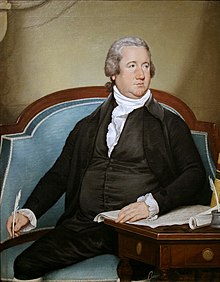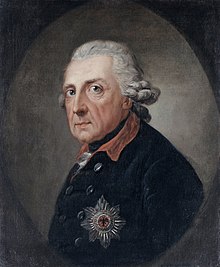Germans in the American Revolution
Despite British Whig opposition to using German soldiers to subjugate the "sons of Englishmen," Parliament overwhelmingly approved the measure in order to quickly raise the forces need to suppress the rebellion.
Early Republican historians, however, defended the term "mercenaries" to distinguish the foreign, professional armies from the idealized citizen soldier who altruistically fought for independence.
[18] Great Britain also offered land and tax incentives to its Loyalist soldiers willing to settle in Nova Scotia in present-day Canada.
[19] The Landgraviate of Hesse-Kassel, in particular, was economically depressed,[20] and had "rented" out professional armies since the 17th century,[21] with general support from both upper and lower classes.
[24] Like their British allies, the Hessians had some difficulty acclimatizing to North America; the first troops to arrive suffered from widespread illness, which forced a delay in the attack on Long Island.
[25] From 1776 on, Hessian soldiers were incorporated into the British Army serving in North America, and they fought in most of the major battles, including those of New York and New Jersey campaign, the Battle of Germantown, the Siege of Charleston, and the final Siege of Yorktown, where about 1,300 Germans were taken prisoner,[26] although various reports indicate that the Germans were in better spirits than their British counterparts.
[30] Captain Frederick Zeng, for example, served out his term with the armies of Hesse-Kassel and remained in the United States, even becoming an associate of Philip Schuyler.
[33][Note 1] These jägers proved essential in the "Indian style" warfare in America, and Great Britain signed a new treaty in December 1777 in which Hesse-Kassel agreed to increase their number from 260 to 1,066.
[37] The war proved longer and more difficult than either Great Britain or Hesse-Kassel had anticipated, and the mounting casualties and extended supply lines took a political and economic toll.
[30] Colonel Wilhelm von Gall is one well-known officer from Hesse-Hanau;[40] he commanded a regiment from Hanau under General John Burgoyne.
[42] In 1775, Charles William Ferdinand ("Prince Carl") told King George III that Brunswick had soldiers who could be used to help put down the rebellion in the Americas.
[51] Riedesel's Brunswick troops made a notable entry into the Battle of Hubbardton, singing a Lutheran hymn while making a bayonet charge against the American right flank, which may have saved the collapsing British line.
[29][54] Some losses were to death or desertion, but many Brunswickers became familiar with America during their time with the Convention Army, and when the war ended, they were granted permission to stay by both Congress and their officers.
[55] As the Duke of Brunswick received compensation from the British for every one of his soldiers killed in America, it was in his best interest to report the deserters as dead, whenever possible.
[8] The dual Margraviates of Brandenburg-Ansbach and Brandenburg-Bayreuth, under Margrave Charles Alexander, initially supplied 1,644 men to the British in two infantry battalions, one company of jägers and one of artillery, of whom 461 did not return home.
The regimental commander, Colonel Johann Ludwig Wilhelm von Hanxleden, complained that his soldiers were sickened and even died due to the climate.
Prince August informed Lord Germain that Waldeck could not recruit new soldiers fast enough to replace those dying in West Florida.
They were unaware that Spain had declared war on Great Britain until they were attacked by forces under Spanish Governor Bernardo de Gálvez.
[74] The other, consisting of some 500 "Pandours" (irregular soldiers recruited from Slavic lands within the Austrian Empire) was sent in 1780 to garrison British-occupied New York City.
[75] Germans were easily the largest non-British European minority in British North America, but their assimilation and Anglicisation varied greatly.
[76] During the French and Indian War in 1756, Great Britain utilized them by forming the Royal American Regiment, whose enlisted men were principally German colonists.
When the Revolutionary War began, Weissenfels deserted the British forces and served with the Patriots from 1775 onward, rising to lieutenant colonel.
[79] Although many German colonists chose to remain neutral during the American Revolution, a significant portion became supporters of either the Patriot and Loyalist causes.
Frederick William, Baron de Woedtke, for example, was a Prussian officer who obtained a Congressional commission early in the war; he died in New York in 1776.
He returned to Estonia after the war, but other German soldiers, such as David Ziegler, chose to stay and become citizens in the nation they had helped found.
[35] The most famous German to support the Patriot cause was Friedrich Wilhelm von Steuben from Prussia, who came to America independently, through France, and served as Washington's inspector general.
Frederick II maintained a grudge against George III since the British monarch had withdrawn military subsidies during the Seven Years' War.
[96] He expressed interest in opening trade with the United States and bypassing English ports, and allowed an American agent to buy arms in Prussia.
U.S. ships were denied access to Prussian ports, and Frederick refused to officially recognize the United States until they had signed the Treaty of Paris.
After the war, Frederick II wrongly predicted that the United States was too large to operate as a republic, and that it would soon rejoin the British Empire with representatives in Parliament.







